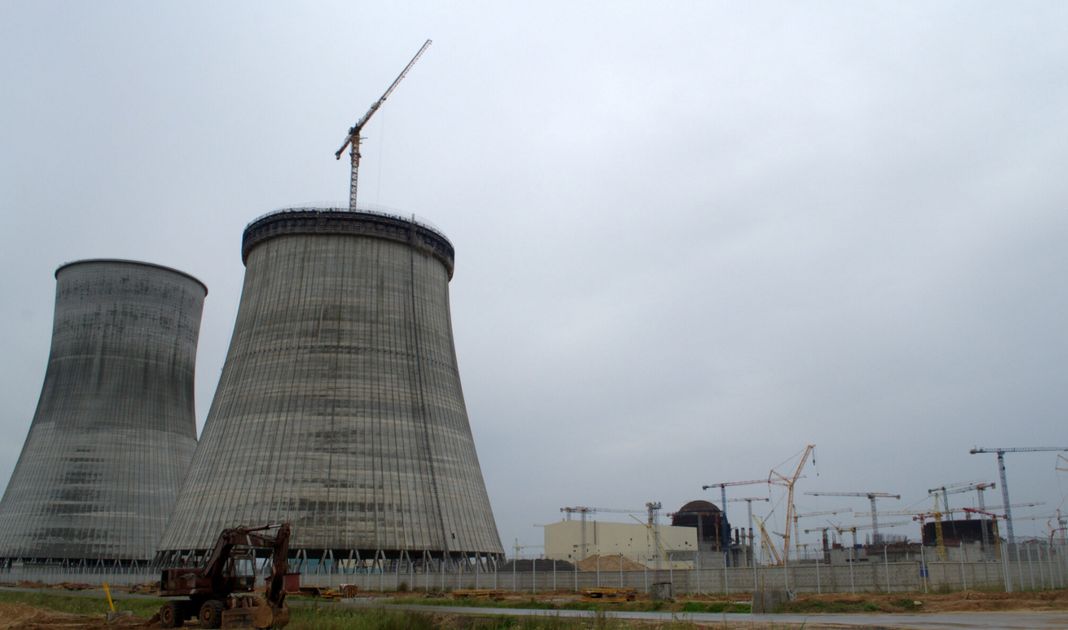Intermarium Weekly 9-16.06.2020

Building Belarus’ first nuclear power plant near Astravyets (wikipedia.org)
Moldavia
Moldovan President Igor Dodon brought army officers onto the streets on June 13 to monitor the enforcement of sanitary measures against coronavirus (COVID-19) for the second time since the epidemic outbreak in March, as the situation has deteriorated abruptly over the past couple of weeks. The move comes as the number of newly reported infected people remained very high (366) for the second day in a row after peaking at 406 on June 11. The number of patients infected with COVID-19 who died on June 13 (13 patients) was the highest since the beginning of the epidemic. The number of active patients keeps rising. Moreover, Dodon sent a team of 75 soldiers to Moscow on June 14 to participate in the Victory Day ceremony originally scheduled for May 9, but delayed due to the pandemic. This move has been broadly criticized by the Moldavian pro-Romanian and pro-EU opposition.
Romania
Romania and China
Romania’s government has mandated the managing board of local nuclear power producer Nuclearelectrica to initiate procedures for terminating negotiations with China General Nuclear Power Group (CGN) on building two new reactors at the Cernavoda nuclear power plant. The government also mandated the managing board to analyse and draw up strategic options on the construction of new electricity generation capacities from nuclear sources. The company will negotiate the termination of the agreement signed in 2015 for developing and operating units 3 and 4 at Cernavoda. At the end of last month, Economy Minister Virgil Popescu said that the collaboration with the Chinese company couldn’t continue as it has yielded no results in seven years. “We have a strategic partnership with the US, and we hold on to it, we respect our partners. We are members of the EU and NATO. Aside from that, I think that seven years since this collaboration with the Chinese company began is enough to realise that we can’t move on,” added Popescu. Liberal Prime Minister Ludovic Orban announced in January that the government would exit the deal with its Chinese partner. He invoked the European Union’s Green Deal rather than security issues or cost concerns circulated previously as the main reason behind a potential end to the deal with CGN to expand Romania’s only nuclear power plant. In August last year, the US included CGN on a blacklist for allegedly trying to get nuclear technology from the US to be used for military purposes in China.
Romania and the U.S.
Romania, which has a strategic partnership with the U.S., is also one of the European countries that rely the most on the U.S. military presence to defend itself against Russia’s aggressive strategy in the Black Sea region. Romania hosts several hundred U.S. soldiers at the Mihail Kogalniceanu military base near Constanta. The country also hosts an anti-ballistic missile shield at the Deveselu military base, which is under U.S. command and which has further strained relations with Russia in recent years. Interestingly, Romania and the United States marked 140 years of diplomatic relationships this past weekend. On June 14, 1880, diplomatic agent and consul general Eugene Schuyler was recognized as the United States’ official representative to Romania. The U.S. ambassador to Romania Adrian Zuckerman called Romania “one of the United States’ closest military and economic allies in Europe.”
Romania and Russia
Romania’s new National Defense Strategy, approved by the Country’s Supreme Defense Council (CSAT), and sent to the Parliament for approval, speaks for the first time about the “aggressive behavior of the Russian Federation” and the “militarization of the Black Sea” being carried out by Moscow. Russia’s Foreign Affairs Ministry has reacted to the document saying that Romania plans to use it to increase NATO and U.S. presence in the Black Sea region. “Bucharest will contribute to further increasing tensions and lack of trust in the region, instead of becoming a stability provider”, Russian Foreign Ministry spokeswoman Maria Zaharova said in a press conference. Romania’s foreign affairs minister Bogdan Aurescu reacted by calling the Russian ambassador in Romania, Valery Kuzmin, to talk about the Russian Foreign Ministry’s statement. According to a Romanian MFA press release, the Russian ambassador in Bucharest, Valery Kuzmin had been summoned to the MFA to talk with the secretary of state on strategic affairs. Dan Neculăescu told the Russian diplomat that “the fact the Russian Federation is mentioned in Romania’s National Defence Strategy must not be a reason of surprise, as it is the effect of the Russian side’s known conduct in the region in the past years”.
Ukraine
Ukraine and China
The Ukrainian postal services, Nova Poshta group is increasing the number of direct flights with China by launching two weekly flights between Kyiv and Beijing. According to the press service of Nova Poshta, “the Chinese direction is now one of the most promising in international trade. In May, we delivered almost 2.5 times more orders from Chinese online stores than in April. Therefore, we decided to charter another additional direct flight on an ongoing basis. Now twice in a week, we deliver goods to both individuals and companies importing from China. An increase in flights will provide our customers with guaranteed delivery times because you don’t have to wait for the right ‘window’ for additional loading.” The company noted that in total more than 520 thousand items were delivered from abroad in May – almost twice as many as in April. This is due to an increase in demand for transportation of goods for business customers and an increase in the number of orders in international online stores.
Furthermore, “Ukrzaliznytsia” and “Ukrposhta” intend to discuss cooperation on the delivery of goods and correspondence from China by rail. After the “Liski” Ukrzaliznytsia branch in Kyiv accepted the first direct container train arriving from China on June 8, the management of Ukrposhta JSC turned to “Ukrzaliznytsia” and announced its interest in the container transportation service.
SE “ANTONOV”
One of the most unique Ukrainian industrial companies – and one that contributes towards the continuity of Ukraine as an industrial power – SE “Antonov” is facing difficult times. This time the challenges are coming from the system and they are clearly bureaucratic. Local staff and leadership are fighting against UKROBORPROM, which they argue is interfering in the company’s operations. Antonov’s leadership believes, that UKROBORPROM goal is to destroy the company. UKROBORPROM initiated a series of audit inquiries and this has very much antagonized the company’s leadership, who have written to the President of Ukraine requesting help. This week the situation turned quite rather aggressive when Aivaras Abromavicius General Director of UKROBORPROM fired the director of the company. Interestingly, the non-Slavic origin of Abromavicius has played an additional role in terms of the local leadership is against the UKROBORPROM. Until now the main desire of local leadership has been to establish an independent system of relations between state and company without UKROBORPROM. The Ukrainian court has postponed the decision of the UKROBORPROM as unlawful.
Ukraine and NATO
On 12 June 2020, the NATO Council recognized Ukraine as an Enhanced Opportunities Partner. This status is part of NATO’s Partnership Interoperability Initiative, which aims to maintain and deepen cooperation between Allies and partners that have made significant contributions to NATO-led operations and missions. As a NATO partner, Ukraine has provided troops to Allied operations, including in Afghanistan and Kosovo, as well as to the NATO Response Force and NATO exercises. Allies highly value these significant contributions, which demonstrate Ukraine’s commitment to Euro-Atlantic security. As an Enhanced Opportunities Partner, Ukraine will benefit from tailor-made opportunities to help sustain such contributions. This includes enhanced access to interoperability programs and exercises, and more information sharing. “This decision recognises Ukraine’s strong contributions to NATO missions, and demonstrates the Alliance’s continued commitment to its partnerships despite the COVID-19 pandemic,” said NATO Spokesperson Oana Lungescu. Ukraine is now one of six Enhanced Opportunities Partners, alongside Australia, Finland, Georgia, Jordan and Sweden. Each of the partners has a tailor-made relationship with NATO, based on areas of mutual interest. Ukraine’s status as an Enhanced Opportunities Partner does not prejudge any decisions on NATO membership.
Ukraine and Poland
Lviv State Aviation Repair Plant (LDARZ), which is part of Ukroboronprom, received one MiG-29 aircraft from the Ukrainian Air Force for repair and modernization to the MiG-29MU1 version. This plane with flight number 26 arrived in Lviv on February 18, 2020, and was hijacked at the dismantling stage. On February 27, 2020, it was dismantled and its system control units were stolen. The theft is now being investigated by law enforcement. But it became clear that this plane belongs to the Polish Air Forces. It turns out that the investigators of the Lviv Territorial Department of the State Bureau of Investigation also attached to the case property that does not belong to LDARZ, but is the property of a foreign customer. Namely – a Polish company, which is responsible for the repair of aircraft before the Ministry of National Defense of Poland. At the end of 2003, Germany sold 22 MiG-29s to the Polish Air Force at a symbolic price of 1.00 euro each. But Poland then had to spend about 43 million euros on aircraft repairs and upgrades. To this day, the repair of Polish aircraft has been carried out with the involvement of Ukrainian companies. Lviv State Aviation Repair Plant is the only enterprise in Ukraine that is able to repair and modernize the MiG-29 in all necessary areas and requirements.
Ukraine and Hungary
According to the Ministry of Regional Development of Ukraine, the Transcarpathian region will be re-shaped under the framework of new administrative reform. By the preliminary calculation, it is possible to say that Hungarian districts will be created in the region. The districts with a compact residence of Hungarians have been united into one district. In the whole region, instead of the 13 districts available today, it is planned to create 5. In previous versions, with proposals for a new administrative division, the creation of such a territorial unit was never envisaged, although such a desire has long been talked about by neighboring Hungary. Today in Beregovoe district, about 75% of the population are ethnic Hungarians, in Vinogradovo district this number is 26%. As a result of such a territorial division in Transcarpathia, the share of Hungarians in it will be more than 50%. The reasons for the ministry’s decision are unknown at this time, but it was noted that the new administrative division came after Ukrainian Foreign Minister Dmytro Kuleba paid a working visit to Hungary in late May. Prior to that, diplomatic relations between the two countries had been constantly deteriorating, and it came to the point that Hungary was blocking the Ukraine-NATO commission. Budapest especially actively criticized the “Law on Language”. There is a completely different situation in Odessa, where the local community of Bulgarians can be significantly affected due to the administrative reform.
Ukraine and U.S.
The US Congress approved a $250 million aid package for Ukraine for 2020 under Ukraine’s Assistance Security Initiative program. The package provides Ukraine with various means of surveillance, counter-battery fire, vehicles, medical equipment, cybersecurity systems and the like. The funds provided are aimed at enhancing the combat capabilities of the Ukrainian Armed Forces.
In the coming days, a second tanker is expected to enter Neftegavan (Odessa) with 11 thousand tons of fuel oil. On June 9, a Meteora tanker moored at the port of Odesa at the berths of Neftegavan, delivering 33 thousand tons of diesel fuel from the Greek port of Elefsis. On the same day, a heavy tanker Chrysanthemum carrying 76.1 thousand tons of US oil has also arrived in Odessa. In the coming days one more tanker will arrive, this time carrying 11 thousand tons Given this vessel, the volume of transshipment of oil and oil products in the port for less than 6 months of this year will be about 874.9 thousand tons, which will significantly exceed the same indicator for the first half of last year – 625.6 thousand tons.
Russia and Ukraine
Gazprom, the Russian gas monopoly, has begun dismantling pipes on Russian territory that deliver gas to Ukraine. The intent seems to be to destroy even the theoretical possibility of gas transit by Ukraine in the future. At the same time, the head of the “GTS Operator” noted that the company will not refuse “small transit” – the use of targeted purchasing by Europeans.
A sign of a possible “improvement” of relations between Moscow and Kyiv was seen with the first restoration of oil-supplies from the Russian Federation to Ukraine since the Ukranian-Russian War. At the end of May Tatneft (Russia) began supplying diesel fuel to its subsidiary Tatneft-AZS-Ukraine, which owns a retail network of 91 gas stations. The first delivery was issued on May 30. In just 10 days of supply (from May 30 to June 8), Tatneft-AZS-Ukraine imported 1,910 tons of diesel fuel produced by the Taneko refinery (Nizhnekamsk, Tatarstan). This is the first known delivery of diesel from Tatneft to its subsidiary in Ukraine since at least 2014. Note that in 2019, Tatneft-AZS-Ukraine hardly imported any diesel fuel and gasoline on its own, acquiring resources in the domestic market.
China and Belarus
A new resident, the company ESS-Group, has been registered in the Sino-Belarussian industrial park “Great Stone”. The project of the Lithuanian-Belarusian company ESS-Group is related to the production of electric scooters and charging stations for them. In addition, the new resident of the park will create software and control systems for sharing electric scooters. The cooperation with China is for example developing in the direction of supply chains.
Forestry institutions are actively developing trade relations with Chinese partners. This week the second container carrying Belarussian lumber was sent from Kolyadichi to Suzhousi (China). The train consists of 44 containers with a total volume of 1,830 cubic meters of lumber. Belarusian lumber is expected to arrive in China within 10-12 days; four times faster than by sea. The previous shipment of wood from Belarus took place in April this year. Access to direct buyers, as well as the start of deliveries of products by container trains will allow Belarusian forestries not only to gain a foothold in the Chinese market, but also to be competitive in it.
This week the Chinese Ambassador to Belarus gave an interview where he emphasized the role One Belt One Road Initiative had in combating the epidemic. For example, against the backdrop of a large-scale suspension of air travel in the world, the number of trains on the China-Europe route from January to April increased by 24% compared to the same period last year. More importantly, on Friday Lukashenka had a phone call with the Chinese General Secretary Xi Jinping. The main topic was the organization of another official Chinese visit to Belarus. Lukashenka recently appointed a new ambassador to China only to call him back for another state appointment. This can only mean that Lukashenka does not trust his political elite. Xi actually voiced his support to Lukashenka in upcoming elections and promised financial assistance to the country.
Belarus and the Union State
An online conference about the future of the Union State between Russia and Belarus was held recently. The Belarusian Ambassador to Russia stated that COVID-19 had downgraded the level of relations between the two states, a scenario which it had been possible to avoid but which Russia did not want. The Union State Secretary Grigory Rapota stated that an additional factor that exerts a negative influence on relations between the two countries is the negative portrayal of Belarus by the Russian media.
Turkey and Belarus on the way towards a Free Trade Agreement
Turkey is expanding its economic connections into Eastern Europe. Ankara is trying to sign free trade agreements with Ukraine and now with Belarus. Belarus and Turkey plan to conclude an agreement on free trade in services. The terms of reference for negotiations on this agreement were signed at a meeting of the Minister of Economy of Belarus, Alexander Chervyakov, with the Turkish Ambassador to Belarus, Mustafa Ozjan. The conclusion of this agreement is expected to create favorable conditions for expanding the structure and volume of Belarusian services exports to Turkey, and subsequently to the markets of the Middle East and North Africa.
Baltic States
Lithuania and History
The Lithuanian parliament passed a resolution on Tuesday, condemning the Soviet occupation and calling on Russia to pay reparations. The resolution, passed unanimously by 114 members of the Seimas, comes in response to Russia’s failure to recognize the Soviet occupation of the Baltic states. The parliament also said Russia had been attempting to rewrite Lithuania’s history. The document states that on June 15, 1940, when the Soviet Union occupied Lithuania, at least a tenth of its citizens, as well as Polish nationals who were granted asylum in Lithuania, fell victim to Soviet repressions. “The Soviets systematically sought to annihilate […] the Lithuanian nation and, thus, undermine the possibility for an independent state to be restored in the future,” the resolution reads. Russia maintains that Estonia, Latvia, and Lithuania joined the Soviet Union and were not occupied. The resolution also states that Lithuania must continue research into the period of armed anti-Soviet and anti-Nazi resistance and present their results to the public.
The Baltic States and Belarus
The topic of Belarus is constantly on the Baltic States’ agenda. This there are concerns regarding potential ecological danger spreading across the border from Belarus. Lithuania’s Environmental Protection Agency is testing water in the river Nemunas following reports of possible pollution near Hrodna, Belarus. Initial results are expected over the next 24 hours, but more detailed results could take up to one week to present. Dmitry Vinchevsky, a Belarusian ornithologist, shared photos of dead fish and other animals on Sunday, and his post was shared by Žuvintas Biosphere Reserve Directorate. Its head Arūnas Pranaitis says he has no doubts about the authenticity of the images. He also said there had been no sightings of suffocating fish in Lithuania, but the short distance from Hrodna to Lithuania, about 30 kilometres, is cause for concern. There have been several reports in the Belarusian media on anglers having seen large numbers of dead fish and other animals in Hrodna.
The discussion about the future of the Astravets nuclear power plant in Belarus has never ceased to irritate the Lithuanians. This time it was not directly about Belarus, but about Latvia. Several Lithuanian MPs protested outside the Latvian embassy in Vilnius on Tuesday, urging the country to back a joint Baltic boycott of Belarusian electricity imports once the Astravyets nuclear plant becomes operational later this year. Lithuanian officials say the plant, located some 50 kilometres from Vilnius is unsafe and is a tool for the Kremlin to apply pressure on Belarus and the Baltic states. The MP Laurynas Kasčiūnas from the conservative Homeland Union party said up to 15 people attended the picket. They presented an appeal to the Latvian ambassador, calling on Riga to prevent electricity from Astravyets from entering the Baltic states in solidarity with Lithuania and Estonia. “We really have many questions on Latvia’s current position; We urge lawmakers to take more political control.” Latvia has previously said it will consider a joint electricity boycott, but is yet to declare its position. Last week, the Lithuanian government debated an amendment to a political declaration where Latvia and Estonia would support Lithuania’s position of not buying Belarusian electricity, but would not join its boycott. Critics say this leaves the possibility of Estonia and Latvia using Lithuanian infrastructure to import electricity from Belarus, as only Vilnius shares a direct connection with Minsk. The Baltic states and Belarus are now connected to the same Soviet-era power grid, controlled by Moscow. Estonia, Latvia and Lithuania are gearing up to switching to a continental European system via Poland by 2025. Vilnius now expects the European Commission to play a more active role in the talks. The hysteria is increasing in Lithuania with potassium iodide pills now being distributed in case of an increase of radiation in the regions bordering with Belarus. Riga until now has been opposed to a common policy on the issue and the Lithuanian Foreign Minister Linas Linkevičius was forced to admit that there’s “no common ground” in Baltics on boycotting Belarusian nuclear energy, as Riga has urged Vilnius to accept a compromise. Poland supports Vilnius in the matter and has promised not to buy electricity from the Belarus.
U.S. troops withdraw from Germany
The presence of US troops in Lithuania is the best way to deter aggression, Lithuanian Defence Minister Raimundas Karoblis said on Friday. Lithuanian officials have long sought an increased NATO and US presence in the Baltic States and Poland to deter Russia following its annexation of Crimea and the war in Ukraine. “The deployment of a US battalion in Lithuania and joint exercises […] are the best means of deterrence in these uncertain times,” said Karoblis during a ceremony marking the departure of a rotational US armoured battalion from Lithuania. Some 500 troops, along with tanks and infantry fighting vehicles, deployed to Lithuania in October 2019 as part of Operation Atlantic Resolve, aimed at deterring Russia. Additionally, the commander of the US battalion, Stephen Johnson, reiterated that “This nine-month deployment has truly been productive not only in terms of strengthening our partnership in security, but also on a much broader scale.”
Polish Prime Minister Mateusz Morawiecki recently emphasized that Poland has been consistently striving to increase the US military presence on its territory. “It is not our intention to achieve this goal at the expense of reducing the American contingent in Germany. The Eastern Flank of the North Atlantic Alliance is a significant component of the transatlantic community. We are convinced that maintaining strong ties is in the interest not only of Poland but of the whole of Europe, including Germany. Negotiations on increasing the number of American troops in Poland are proceeding as planned and I believe, he stated, that the outcome will be impressive” added Morawiecki. At the same time the head of the Polish National Security Bureau (BBN), Paweł Soloch, said that Warsaw is currently not negotiating with Washington about the deployment of US nuclear weapons on its territory, but a serious discussion has been triggered in Polish political and intellectual cycles about even the possibility of such an option.
As evidence of U.S. commitment to the allies from the Eastern Flank of NATO, the United States has continued its “B-52 Diplomacy.” On Monday, a United States B-52 strategic bomber flew low over Tallinn. Sigrid Pukk, spokesperson for the Estonian Air Force said: “Today, a United States bomber B-52 flew over Estonian airspace. It was a cooperation exercise involving the Estonian Defense Forces, after which a 360-degree formation flight was taken over Tallinn.” The bomber was accompanied by a French Mirage 2000-5 and a British Eurofighter. The U.S. has allocated more than $100 million worth of military assistance to Estonia over the last years. Close to 150 training exercises and other events are held a year, with over 60 of those involving U.S. military members stationed in Estonia. The B-52 also did a flyover in Tallinn in October of last year.
Autor
Ridvan Bari Urcosta
Senior Analyst at Strategy&Future






Trwa ładowanie...